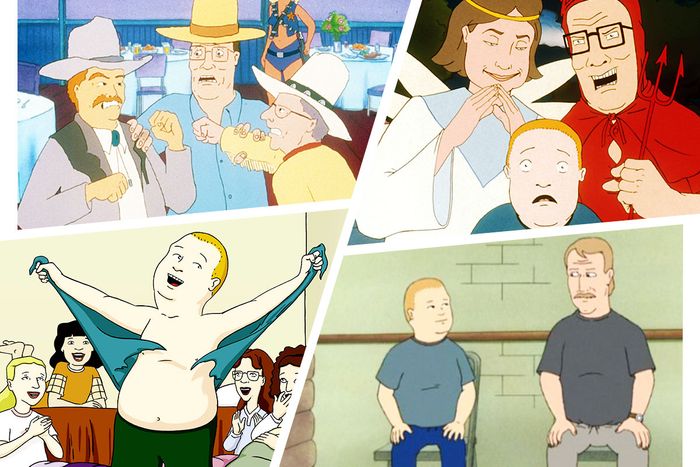
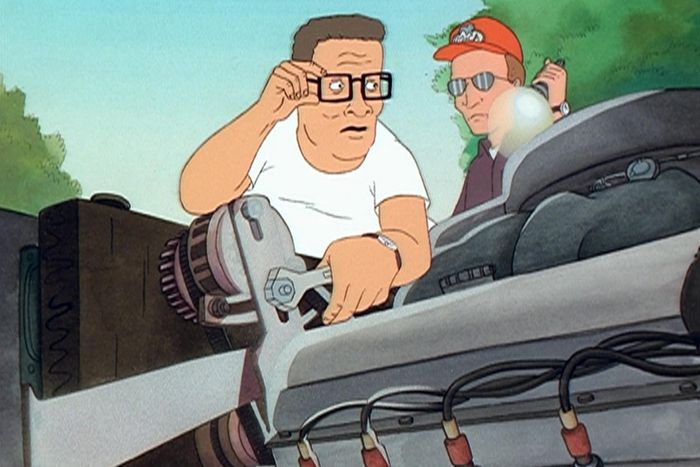
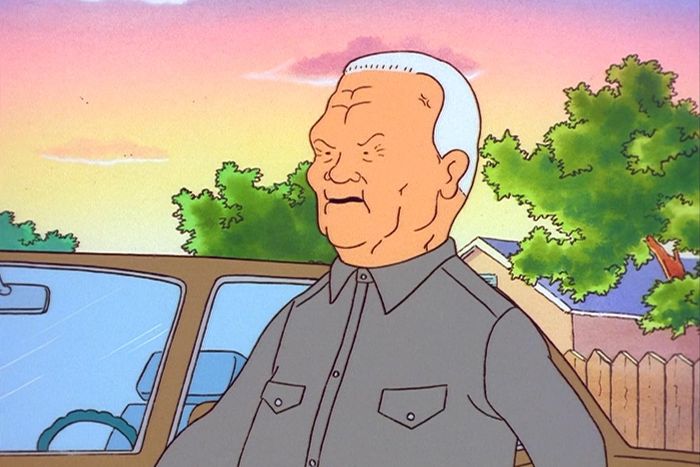
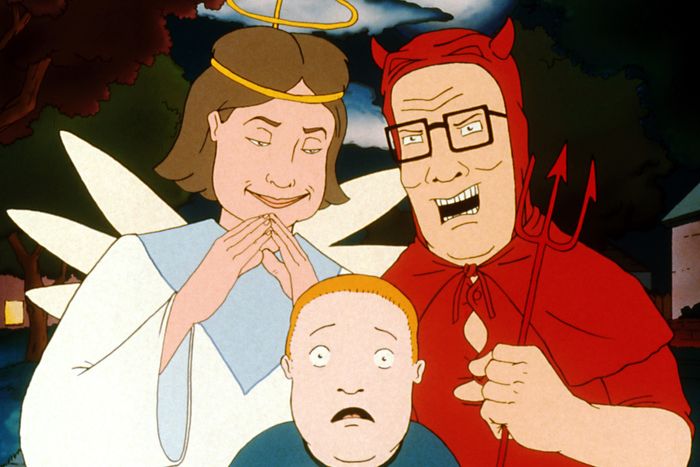
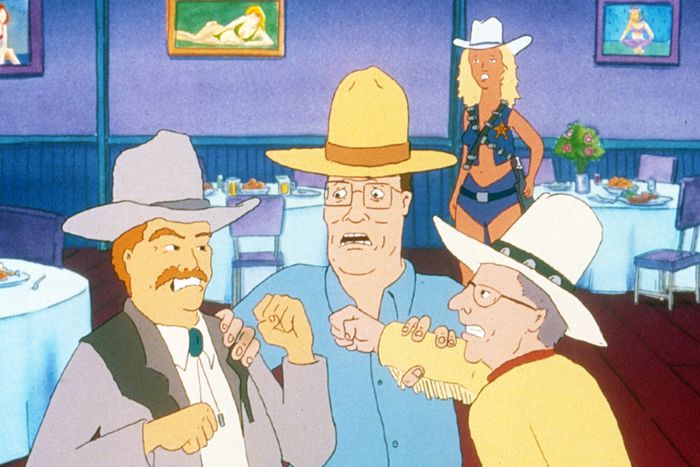
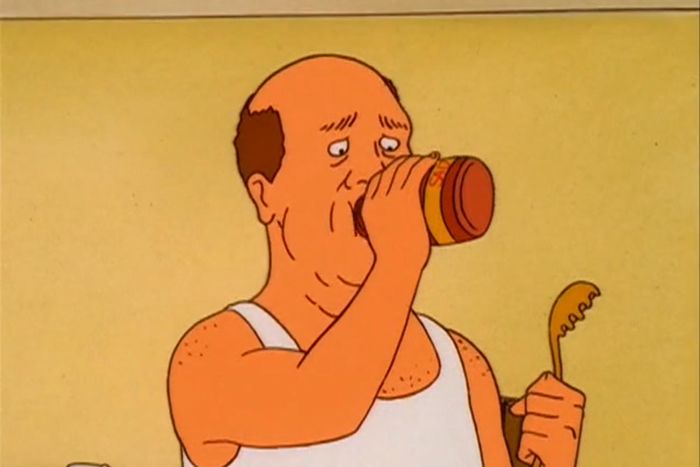
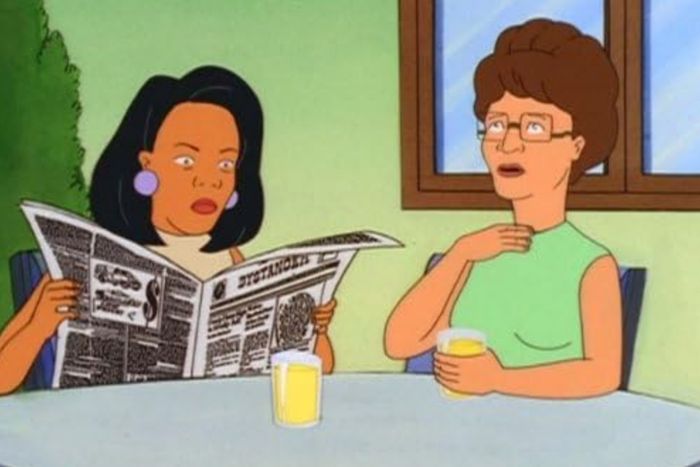
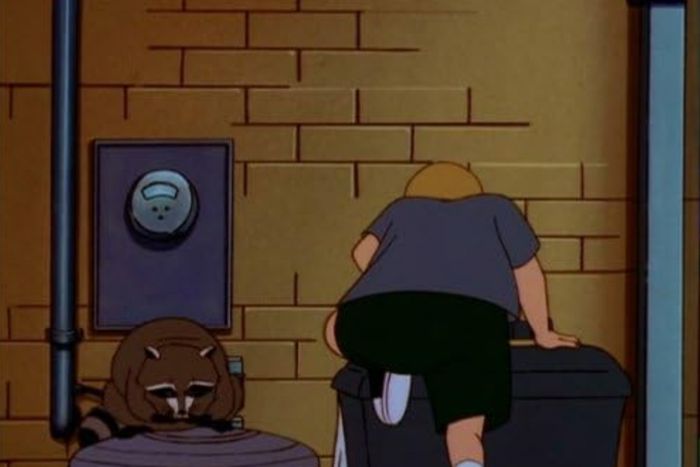
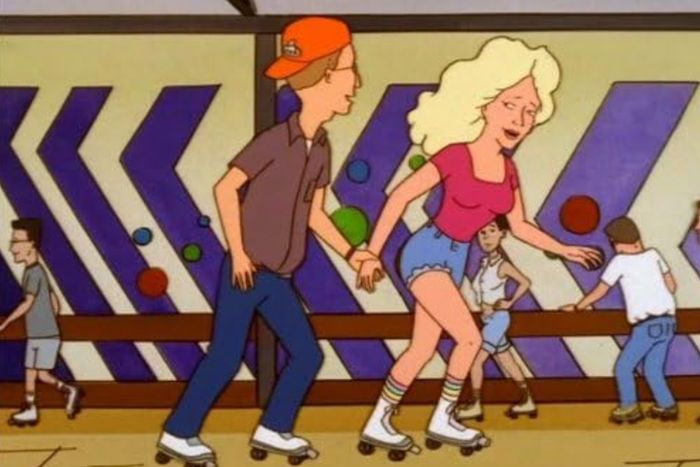
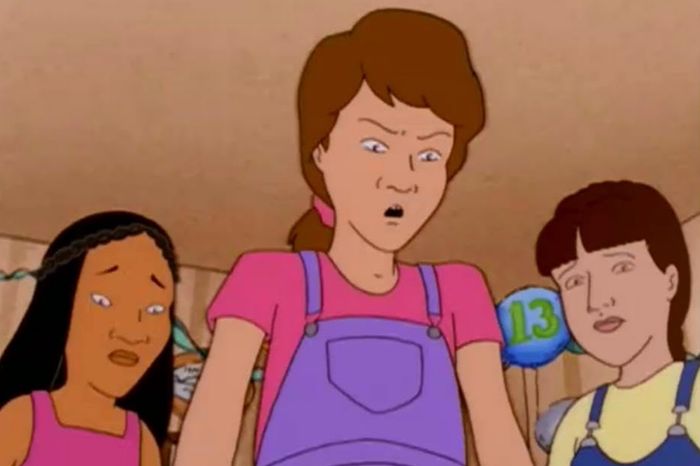
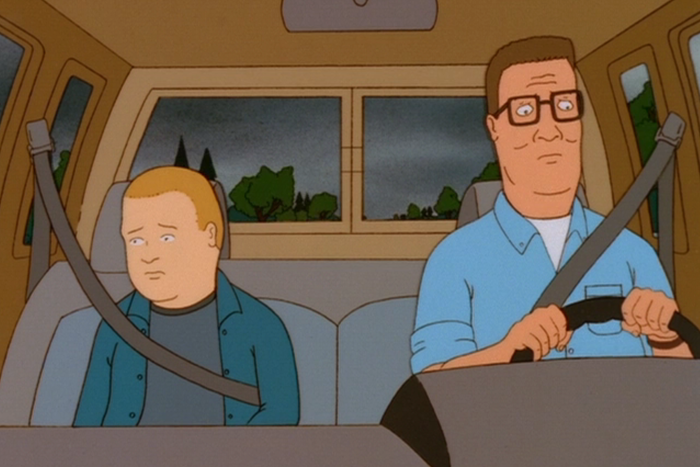
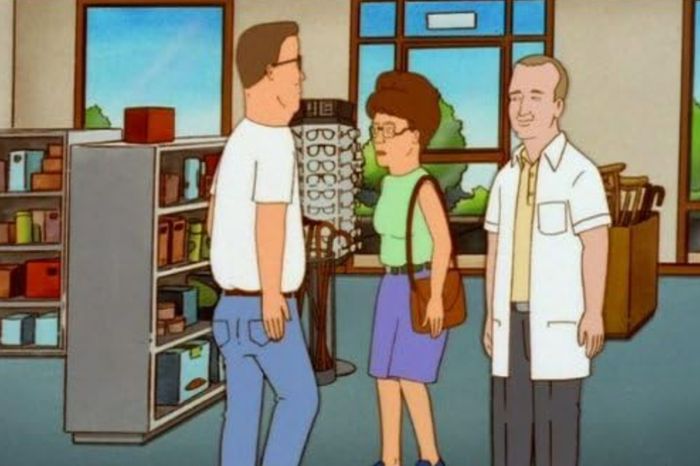
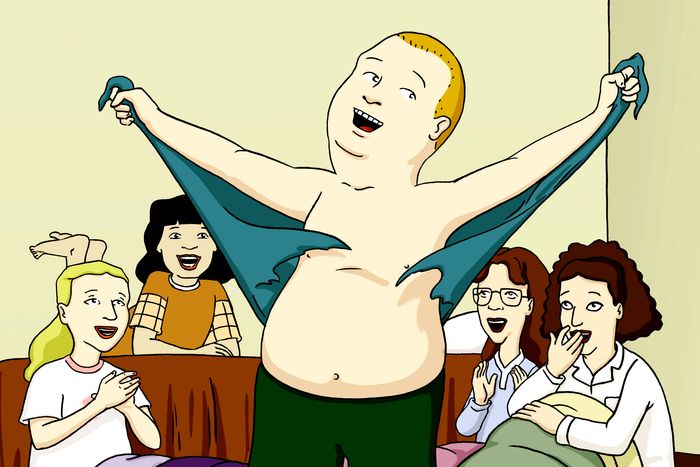

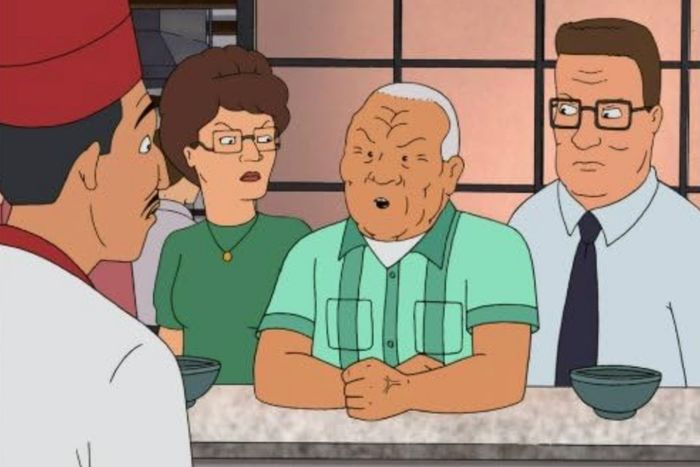
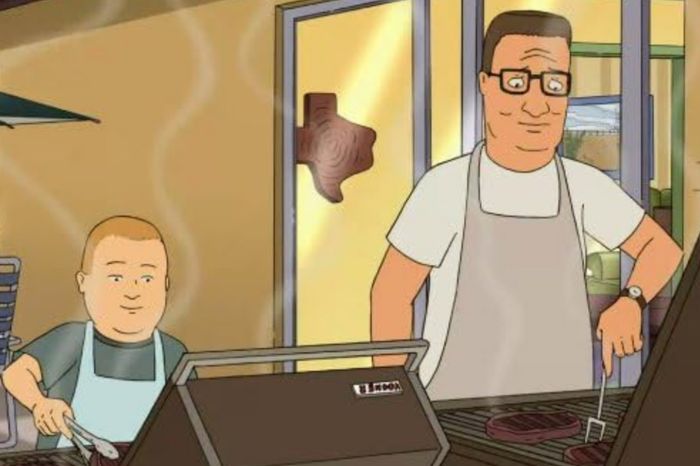

Photo-Illustration: Vulture; Photos: 20th Century Fox
After a 16-year hiatus, King of the Hill returns this August. The original series, which featured everyone’s favorite purveyor of propane (and propane accessories), Hank Hill, and his family, lasted for 13 seasons. And now, in the upcoming Hulu revival, Hank and Peggy come back to their old house in Arlen, Texas, from an extended stay in Saudi Arabia to see how much the community has changed — and how much has stayed the same. One thing is for sure: Their once diminutive son, Bobby, has gotten a lot taller. “That boy ain’t right,” but at least his growth spurt finally kicked in.
But 13 seasons is a lot of television to cover. And while there’s no better way to watch King of the Hill than to engage with the entire thing, here are 15 episodes that encapsulate the show as one of the most delightfully weird and surprisingly humane series to come out of adult animation. Because there’s a lot of heart to be found in Hank and his pals, something that’s clear from the first episode.
Photo: 20th Century Fox
Much of King of the Hill’s early seasons are marked by a familiar storytelling pattern: Hank Hill (Mike Judge) is wrong about something, his stubbornness about being wrong makes things worse, and he eventually decides to change his ways. Now, the sitcom formula, in which main characters tend to remain static or, at the very least, consistently defined by certain marketable traits, means that those changes rarely make it past the end credits, so Hank’s overall evolution is a very slow one. But one reason why King of the Hill’s writers kept coming back to that well is because it’s both potent and satisfying, especially since Hank is, at his core, a good man.
In the pilot, generational differences and an inability to get his son, Bobby (Pamela Adlon), to commit to the things Hank cares about causes him to emotionally lash out. Combine that with a black eye that Bobby gets during a baseball game and, soon, all of Arlen is gossiping that Hank is abusing his son. Hank must come to terms with the fact that his actions have an unintended effect on Bobby and that he won’t get the relationship that he yearns for unless he also puts in the effort. It’s a silly, snowballing plot that wraps up with pure emotional sweetness — an arc that will come to be a King of the Hill specialty.
Photo: 20th Century Fox
One thing that becomes apparent in King of the Hill is how many life lessons are passed down and how often one must come to terms with how they were raised in order to make progress in the future. For example, Hank’s niece, Luanne (the late Brittany Murphy), struggles to find her place in the world because her own family gave her little to strive for. And Hank’s own clumsy attempts at hypermasculine child-rearing often come from his father, Cotton (Toby Huss).
Cotton, who lost his shins in World War II, tries to impress his warped ideas about women and domesticity on Bobby, whose receptiveness to it eventually horrifies Hank. Hank and Peggy (Kathy Najimy) not only have to confront Cotton but make a stand for themselves. As King of the Hill goes on, it becomes clear that Cotton will never be truly proud of Hank or accept his manner of doing things, no matter how much he might subconsciously imitate his dad. “Shins of the Father” begins the slow march toward being his own man.
Photo: kingofthehill-6-18-2025/Everett Collection
Most of the leading characters in King of the Hill are nakedly conservative, ranging from the tradition-embracing Hank to his conspiracy-theory-spouting neighbor, Dale Gribble (the late Johnny Hardwick). But the series often satirized those whose beliefs had warped them into grating extremism, like in “Hilloween,” in which a woman from the local bible study attempts to turn Arlen residents against Halloween. Her religious alternative, Hallelujah House, angers Hank, and the episode ends with him wearing a devil costume and leading a march against her.
The episode is also a showcase for the many dimensions of Peggy Hill, a woman often driven by her ego. However, that’s not always a bad thing. When Luanne tries to sway Bobby over to the righteousness of Hallelujah House, Peggy dresses her down for trying to decide things that are not her business. Yes, it’s Peggy asserting her control over Bobby, but it also shows that she deeply cares for her son and doesn’t want him to take part in some hollow moralistic crusade (on Halloween of all days!).
Photo: 20th Century Fox/Everett Collection
Arlen is a part of Texas, but it’s not stereotypical Texas. There are few cowboy boots, big belt buckles, or wide-brim hats. Instead, there’s Hank Hill, a man who just wants to drink beer and get by in the propane business. “The Company Man” introduces Burt Reynolds (King of the Hill was very fond of its celebrity voice actors) as the bolo-tie-wearing M.F. Thaterton, owner of a competing propane company that’s eager to land the same client as Hank’s Strickland Propane.
Hank tries to appease the client, taking him around and satisfying his Texan wish-fulfillment fantasy. But in the end, his respect for the art of the propane deal outweighs his willingness to create a country-western facade. Hank might have had an accent that made him stick out in the adult-animation crowd, but he didn’t want to be defined by it.
Photo: 20th Century Fox
King of the Hill characters were not immune from the trauma of their pasts. Bill (Stephen Root), Hank’s chronically schlubby pal, falls into a depression at Christmastime over the fact that his ex-wife cheated on him and abandoned him. Bill obsesses over it: He leaves gifts out on the off chance that his ex will return; he ruins dinners by bringing up heartbreak; and he even makes a half-hearted effort at committing suicide by leaping from an eight-foot roof.
It culminates with Bill arriving at a Christmas party in a dress, having taken on the guise of his ex and adopting her mannerisms. An exercise in terrible comedic taste could have followed, but King of the Hill plays it with odd pathos. To soothe the torment Bill is receiving from other guests, Hank puts on a dress as well, takes on the role of Bill’s ex, and forces him to move on. It’s a kind, ludicrous gesture, but it comes from the kind of love that Hank would never express outright.
Photo: Fox
Considering how rare it is to find unfiltered expressions of admiration from King of the Hill characters, it might be even tougher to see them healthily deal with grief. When Luanne’s apathetic boyfriend, Buckley (David Herman), dies in a Mega Lo Mart explosion, Luanne struggles to move on. To be fair, Luanne struggles with a lot. She’s gullible, quick to take things personally, and finds it hard to fit in in Arlen. “Wings of the Dope” sees her telling Arlen residents that she’s having visions of Buckley in angel wings, and the reactions range from sharing in her belief to a fear that she’s hallucinating due to exposure to too much hair-care products.
But in finally understanding that Buckley has moved on, Luanne is allowed to grow, too. She decides to enroll in Arlen Community College and reorient her career. And Buckley is able to improve his reputation beyond being a clueless store clerk. The scene of Luanne and Buckley jumping on a trampoline to “Life in a Northern Town” is one of the most profoundly beautiful moments in the entire show. It’s young love, melancholy, and supernatural eccentricity all rolled into one, a show full of emotionally stunted people wearing their heart on their sleeve.
Photo: 20th Century Fox
While some animated sitcoms could get away with crossing over into Looney Tunes territory, King of the Hill’s ventures into absurdity often seemed misplaced (though there was meme-able hilarity to be mined from Hank unwittingly becoming a “pimp” in “Ho, Yeah!”). The perfect balance came when the show tackled its tendency for paranoia, as in “To Kill a Ladybird,” in which Bobby adopts a raccoon as a pet, and Dale, after trying to catch the critter, becomes convinced that he has rabies.
Dale eventually flees into the woods, setting up a camp that is equal parts Lord of the Flies and Deliverance. It’s outlandish, but it also works. Dale is already a deluded person, and this fear plays into his established personality. And it shows the skill of the King of the Hill creative team at the time. It’s easy to throw the characters into an outlandish scenario, but it’s much more satisfying to take a character and stretch them to their funniest limit.
Photo: 20th Century Fox
A long-running joke in early King of the Hill is that Dale’s wife, Nancy (Ashley Gardner), is having an open affair with John Redcorn (the late Victor Aaron and Jonathan Joss). Dale, though, is totally blind to it, even though his son, Joseph (Breckin Meyer), resembles John a great deal. But King of the Hill decides to pull the plug on the joke and have John and Nancy end their affair in this fourth-season episode. It makes for some curious introspection on the parts of Nancy and John, two characters who could have easily been one-note but are instead allowed a chance to change.
After the anti-government Dale passionately helps John with his dispute with the Bureau of Indian Affairs, John decides that he doesn’t wish to potentially hurt Dale anymore, even if he is clueless. Meanwhile, Nancy grows fond of Dale again when he leans into his adoring side, and though she is far from perfect going forward, she, too, decides to spare her husband from pain. In King of the Hill, everyone gets the call to change, and the most noble moments come when they listen.
Photo: 20th Century Fox
It’s always a good episode when Bobby Hill yearns for love. (The third season’s “And They Call It Bobby Love” nearly made this list.) But “I Don’t Want to Wait” outpaces it because it’s so relatable and personal. Bobby is almost 13 and enjoying the little tastes of adulthood that he’s getting. However, when he finds that his best friend, Joseph, has grown a lot over summer vacation, he becomes desperate and paranoid. Meanwhile, Joseph writhes in the agony of his own newfound girl craziness (and cleavage obsession). And neither is really willing to admit their insecurities.
The whole thing becomes a hormonal hurricane, especially when Bobby (who is already freaking his girlfriend, Connie, out with his behavior) catches Joseph and Connie (Lauren Tom) making out. Much of King of the Hill was about the malaise of adulthood and the aches that come when you have to live up to your own role as a parent. But it was equally adept at painting growing up as both wonderful and deeply, hilariously chaotic.
Photo: 20th Century Fox
Hank Hill tries to keep things stiff-lipped, which causes cracks to form under the emotional pressure. Even Hank’s signature “BWAAAAH!” reaction feels like a man for whom emotion only comes out when the wall gives way. And when Hank can’t come to terms with the decrepitude of his old truck, he finds himself weeping in a movie theater — not because of the movie’s plot about a dying old man, but because he associates that old man with his old truck.
Is Hank subconsciously trying to come to terms with the idea that everything, man and truck alike, inevitably ages and dies? It wouldn’t be an outlier — when Hank hurts his back and can’t work in “Hank’s Back,” it shatters his entire view of himself. Regardless, the truck’s destruction eventually creates a bonding moment with Hank, Bobby, and the most reliable member of the elder generation that Hank knows: the memory of his old truck.
Photo: 20th Century Fox
Many episodes on this list are chosen because they reflect some part of King of the Hill’s emotional core, but the show was great when it could run with a silly gag as well. In “Hank’s Back Story,” Hank learns that he’s having pain in his back due to the fact that he has a condition that has left him with “no ass.” Thus, he’s spent years effectively sitting on the base of his spine. In order to recover, Hank has to wear a prosthetic behind.
King of the Hill was no marvel of complicated animation — its designs were built to have a kind of everyman naturalism, and the characters move with little grace. But “Hank’s Back Story” contains some lovely physical comedy, and the simple sight of Hank standing in his hospital gown with what little bare ass he has poking out is funny in a way that sticks out. It’s King of the Hill switching to a different but nonetheless fantastic gear.
Photo: 20th Century Fox/Everett Collection
“That’s my purse! I don’t know you!”
It’s likely the most famous line in the entire series, and it comes from Bobby Hill joining a women’s self-defense class in the season-six premiere, “Bobby Goes Nuts.” He does it in order to deal with bullying, as Hank proves to be an ineffective teacher of self-defense, and all of the men’s/boys’ self-defense classes are full. And while learning to kick men in the crotch is initially empowering to Bobby, he begins to use that as a solution to every problem.
Enter Peggy Hill. Peggy is not known for her scruples. Hank might be bound to an inner masculine code of honor, but Peggy will unabashedly fight dirty when she has to. And Peggy deals with Bobby fighting dirty by embarrassing him and giving him noogies as Hank and the neighbors watch. The tactics are questionable and the lesson is messy, but Peggy is nothing less than effective.
Photo: 20th Century Fox
Few things are worse than learning that the people who you consider your best friends are hanging out without you. It’s what Hank finds out in “Hank’s On Board” when he discovers that Dale, Bill, and Boomhauer (Mike Judge) are deliberately leaving him out of group-vacation activities, something Peggy ascribes to Hank acting bossy around them. However, a boating disaster ends up revealing that his friends actually need him. After all, he’s pretty much the only adult they can count on.
Later seasons of King of the Hill didn’t experience the sheer drop-off of its animated contemporaries, but there are some diminishing returns. The plethora of celebrity voice cameos can feel grating, and the plots tend to lose the local Arlen vibe that made the first few seasons so immediately identifiable. But “Hank’s On Board,” the opening episode of the tenth season, showed that King of the Hill could be counted on to find its way back to its own humanity from time to time.
Photo: 20th Century Fox
Cotton Hill isn’t a villain. There are moments, like in the climax of the sixth season’s “Unfortunate Son” (in which he treats a group of Vietnam veterans with the understanding they deserve), when he seems downright empathetic. He’s just not the father that Hank needs, and any moves that Hank makes to reach out to him are often rebuffed with callousness. When he is on his deathbed in the hospital, Hank tries once more, in the hopes that his father will recognize that people love and appreciate him. But Cotton, annoyed by Hank’s indirectness and emotion, browbeats his son.
We all hope that our parents, even the worst ones, will come around for us one day. That they’ll see what we always wanted them to see: that they’ve been loved and that they love us in return. But King of the Hill offers the sobering lesson that, sometimes, that just doesn’t happen. And even when Peggy, seeing her husband distraught, tells Cotton that she hopes he lives forever so that he can be eternally miserable in the hell of his own creation, Cotton gives her no gratification. “Do ya, now?” he shouts before abruptly dying. Peggy, of course, tells Hank that his father’s final words were an admission of love for his son, saving him from his father’ s last act of cruelty.
Photo: 20th Century Fox
How do you end King of the Hill? To give everyone a dramatic farewell would feel unnatural in a show that did so well with the small moments. However, a dispassionate parting doesn’t suit characters who have often worked so hard just to display any feelings at all. “To Sirloin With Love” opts to work in the area that the series has always found its most potential: the relationship between Hank and Bobby.
In this (temporary) finale, Hank and Bobby bond over a love of grilling meat, and the episode closes on the entire community enjoying the pair’s cooking. There’s no telling how long it will last; in King of the Hill, as in real life, it’s clear that the interests of young people like Bobby can change in an instant. But what matters are the moments, the episodes, in which those joys can be shared as a family. “That boy ain’t right,” but he’s the best son that Hank Hill could ever ask for.
Source link
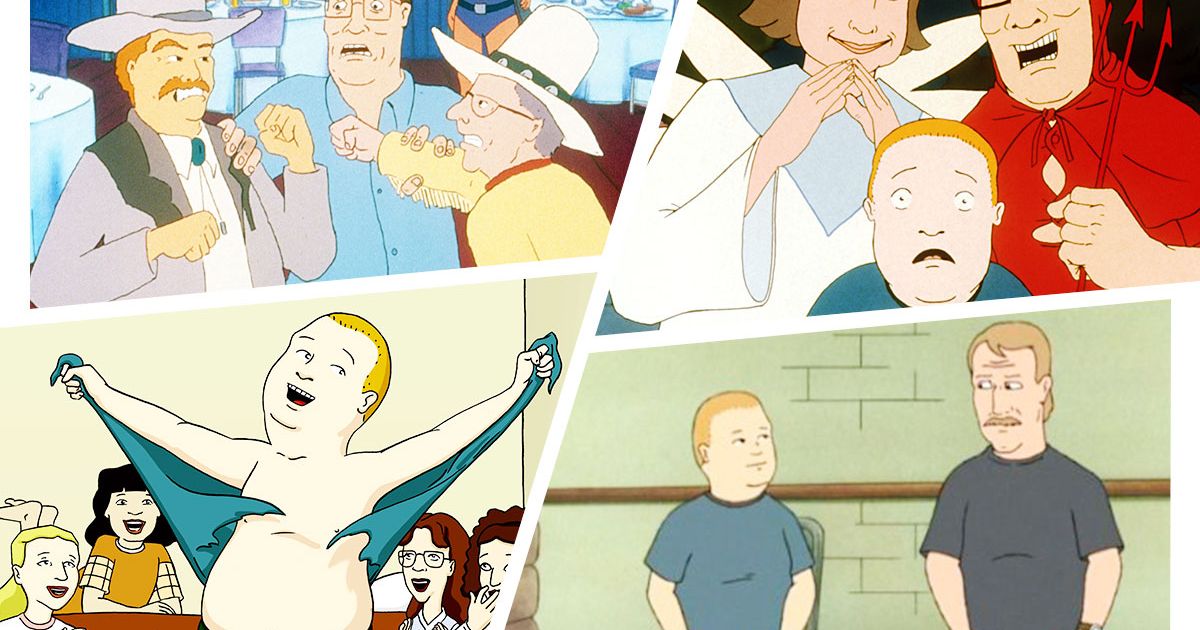
اترك تعليقاً